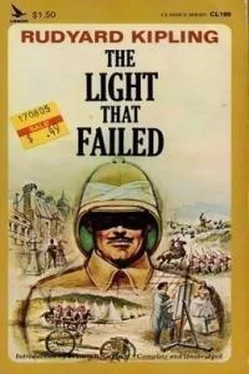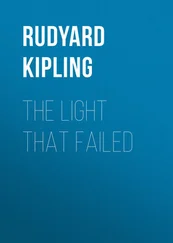'Binks, is that a true bill?' said Torpenhow, severely. The little dog retreated under the sofa cushion, and showed by the fat white back of him that he really had no further interest in the discussion.
'Strikes me that another disreputable dog went for a walk, too,' said the Nilghai. 'What made you get up so early? Torp said you might be buying a horse.'
'He knows it would need three of us for a serious business like that. No, I felt lonesome and unhappy, so I went out to look at the sea, and watch the pretty ships go by.'
'Where did you go?'
'Somewhere on the Channel. Progly or Snigly, or some watering–place was its name; I've forgotten; but it was only two hours' run from London and the ships went by.'
'Did you see anything you knew?'
'Only the Barralong outwards to Australia, and an Odessa grain–boat loaded down by the head. It was a thick day, but the sea smelt good.'
'Wherefore put on one's best trousers to see the Barralong?' said Torpenhow, pointing.
'Because I've nothing except these things and my painting duds. Besides, I wanted to do honour to the sea.'
'Did She make you feel restless?' asked the Nilghai, keenly.
'Crazy. Don't speak of it. I'm sorry I went.'
Torpenhow and the Nilghai exchanged a look as Dick, stooping, busied himself among the former's boots and trees.
'These will do,' he said at last; 'I can't say I think much of your taste in slippers, but the fit's the thing.' He slipped his feet into a pair of sock–like sambhur–skin foot coverings, found a long chair, and lay at length.
'They're my own pet pair,' Torpenhow said. 'I was just going to put them on myself.'
'All your reprehensible selfishness. Just because you see me happy for a minute, you want to worry me and stir me up. Find another pair.'
'Good for you that Dick can't wear your clothes, Torp. You two live communistically,' said the Nilghai.
'Dick never has anything that I can wear. He's only useful to sponge upon.'
'Confound you, have you been rummaging round among my clothes, then?' said Dick. 'I put a sovereign in the tobacco–jar yesterday. How do you expect a man to keep his accounts properly if you―'
Here the Nilghai began to laugh, and Torpenhow joined him.
'Hid a sovereign yesterday! You're no sort of financier. You lent me a fiver about a month back. Do you remember?' Torpenhow said.
'Yes, of course.'
'Do you remember that I paid it you ten days later, and you put it at the bottom of the tobacco?'
'By Jove, did I? I thought it was in one of my colour–boxes.'
'You thought! About a week ago I went into your studio to get some 'baccy and found it.'
'What did you do with it?'
'Took the Nilghai to a theatre and fed him.'
'You couldn't feed the Nilghai under twice the money—not though you gave him Army beef. Well, I suppose I should have found it out sooner or later. What is there to laugh at?'
'You're a most amazing cuckoo in many directions,' said the Nilghai, still chuckling over the thought of the dinner. 'Never mind. We had both been working very hard, and it was your unearned increment we spent, and as you're only a loafer it didn't matter.'
'That's pleasant—from the man who is bursting with my meat, too. I'll get that dinner back one of these days. Suppose we go to a theatre now.'
'Put our boots on,—and dress,—and wash?' The Nilghai spoke very lazily.
'I withdraw the motion.'
'Suppose, just for a change—as a startling variety, you know—we, that is to say we, get our charcoal and our canvas and go on with our work.'
Torpenhow spoke pointedly, but Dick only wriggled his toes inside the soft leather moccasins.
'What a one–ideaed clucker that is! If I had any unfinished figures on hand, I haven't any model; if I had my model, I haven't any spray, and I never leave charcoal unfixed overnight; and if I had my spray and twenty photographs of backgrounds, I couldn't do anything to–night. I don't feel that way.'
'Binkie–dog, he's a lazy hog, isn't he?' said the Nilghai.
'Very good, I will do some work,' said Dick, rising swiftly. 'I'll fetch the Nungapunga Book, and we'll add another picture to the Nilghai Saga.'
'Aren't you worrying him a little too much?' asked the Nilghai, when Dick had left the room.
'Perhaps, but I know what he can turn out if he likes. It makes me savage to hear him praised for past work when I know what he ought to do. You and I are arranged for―'
'By Kismet and our own powers, more's the pity. I have dreamed of a good deal.'
'So have I, but we know our limitations now. I'm dashed if I know what Dick's may be when he gives himself to his work. That's what makes me so keen about him.'
'And when all's said and done, you will be put aside—quite rightly—for a female girl.'
'I wonder…Where do you think he has been to–day?'
'To the sea. Didn't you see the look in his eyes when he talked about her? He's as restless as a swallow in autumn.'
'Yes; but did he go alone?'
'I don't know, and I don't care, but he has the beginnings of the go–fever upon him. He wants to up–stakes and move out. There's no mistaking the signs. Whatever he may have said before, he has the call upon him now.'
'It might be his salvation,' Torpenhow said.
'Perhaps—if you care to take the responsibility of being a saviour.'
Dick returned with the big clasped sketch–book that the Nilghai knew well and did not love too much. In it Dick had drawn all manner of moving incidents, experienced by himself or related to him by the others, of all the four corners of the earth. But the wider range of the Nilghai's body and life attracted him most. When truth failed he fell back on fiction of the wildest, and represented incidents in the Nilghai's career that were unseemly,—his marriages with many African princesses, his shameless betrayal, for Arab wives, of an army corps to the Mahdi, his tattooment by skilled operators in Burmah, his interview (and his fears) with the yellow headsman in the blood–stained execution–ground of Canton, and finally, the passings of his spirit into the bodies of whales, elephants, and toucans. Torpenhow from time to time had added rhymed descriptions, and the whole was a curious piece of art, because Dick decided, having regard to the name of the book which being interpreted means 'naked,' that it would be wrong to draw the Nilghai with any clothes on, under any circumstances. Consequently the last sketch, representing that much–enduring man calling on the War Office to press his claims to the Egyptian medal, was hardly delicate. He settled himself comfortably on Torpenhow's table and turned over the pages.
'What a fortune you would have been to Blake, Nilghai!' he said. 'There's a succulent pinkness about some of these sketches that's more than life–like. "The Nilghai surrounded while bathing by the Mahdieh"—that was founded on fact, eh?'
'It was very nearly my last bath, you irreverent dauber. Has Binkie come into the Saga yet?'
'No; the Binkie–boy hasn't done anything except eat and kill cats. Let's see. Here you are as a stained–glass saint in a church. Deuced decorative lines about your anatomy; you ought to be grateful for being handed down to posterity in this way. Fifty years hence you'll exist in rare and curious facsimiles at ten guineas each. What shall I try this time? The domestic life of the Nilghai?'
'Hasn't got any.'
'The undomestic life of the Nilghai, then. Of course. Mass–meeting of his wives in Trafalgar Square. That's it. They came from the ends of the earth to attend Nilghai's wedding to an English bride. This shall be an epic. It's a sweet material to work with.'
'It's a scandalous waste of time,' said Torpenhow.
'Don't worry; it keeps one's hand in—specially when you begin without the pencil.' He set to work rapidly. 'That's Nelson's Column. Presently the Nilghai will appear shinning up it.'
Читать дальше












